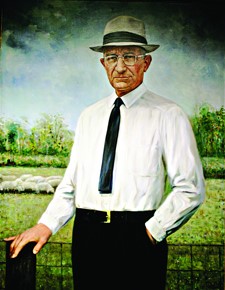Donor Spotlight: J Clayton Arnold, A Portrait of Inspiration
How does a retired rural mail carrier change the world? Through education, of course! The College of Education, Health, and Human Sciences appreciates the legacy and inspiration that J. Clayton Arnold represents to our College and University.
J. Clayton Arnold, the first donor of a $1 million dollar gift to the University of Tennessee, was a bachelor that had no formal ties to UT. He was educated in a two-room Thompson Station schoolhouse near Williamson County and never attended college.
When he was in his forties, he felt the need to further his own education and drove back and forth to Nashville to attend law school at night and although he never received his degree, he did pass the state bar exam and consulted on a part-time basis. He was an entrepreneur for a time with his own mail order seed business, but primarily spent his career delivering mail on a rural route in Tennessee earning $60/month for 34 years.
Clayton considered himself a miser that made fortunate investments. He considered education one of his most worthwhile investments. Clayton shared his heart for educators when he stated “I only had two dedicated and inspiring teachers in all of my schooling. We need more of that today.” This sentiment doesn’t age; it is as true today as it was more than 50 years ago.
By 1963, Clayton knew he wanted to invest his savings in education but had not decided where. President, Andy Holt, and Vice President of Development, Ed Boling engaged him in numerous conversations and Clayton chose UT. It was simple mathematics for him. He was confident that his money would go father at UT. He said, “Out of the fund I have set up there, 5,000 students who are planning to be teachers can be helped. If each of them influences 5,000 children, I feel that my money will help over 25 million children.”
To date, almost 1,000 teachers have been awarded scholarship support through Clayton’s gift totaling more than $2 million. Using Clayton’s own math—his gift has touched nearly half a million children.
Starting in 1967, Clayton continued his support of UT by starting a series of challenges for UT Alumni to invest in their University. Each time our alumni would rise to the challenge, he generously added to their gifts. His generosity inspired a challenge in in the Spirit of J. Clayton Arnold by an anonymous donor that matched $1 million raised. His legacy continues.
In a 1970 newspaper interview from The Tennessean, J. Clayton Arnold said, “People say that you have such a love for humanity, but it’s not a fact. I don’t have affection for the human race, but I do have loyalty to it. I think that there is still hope for it. I’d rather do something for people that talk about love…After all, love without loyalty is not love at all.”
Thank you J. Clayton Arnold for your faith, loyalty, and yes, love. Pure inspiration.
10 Fun Facts about J Clayton Arnold
- He had a black English shepard named Zip (zip code).
- He often quoted Socrates and Plato.
- He planted peach trees on his property and had a project to develop ones that bloomed late in the spring to avoid the spring frost.
- He was interested in psychic phenomena.
- He was a bachelor and once said “I believe in the institution of marriage, but if I had married, I would have expected too much of my wife that I would have been disappointed. It would have been awful.”
- When he was 14, he decided to make a million dollars.
- He always hated tests but was inspired by his sixth grade teacher, Ms Blackburn, who he always felt gave him a “square deal.”
- He was born and lived in the house that his parents built in 1866 on 156 acres.
- He was the 10th of 13 children in his family.
- He said “I don’t have any fears about these rowdy students on the campuses. I felt the same way when I was 21. They will learn. Nothing takes the place of experience.”
